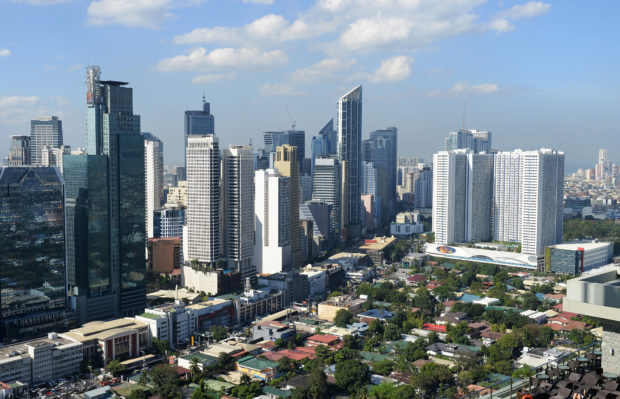‘Like a ricocheting bullet’: PH braces for impact of Putin war on Ukraine

This photo taken on January 29, 2019 shows a general view of the skyline of the financial district of Makati in Manila. (Photo by Ted ALJIBE / AFP)
MANILA, Philippines—The Philippines is bracing for the indirect, spillover impacts of economic sanctions on Russia following Vladimir Putin’s invasion of Ukraine, according to President Rodrigo Duterte’s chief economic manager.
Finance Secretary Carlos Dominguez III told Bloomberg last Wednesday (March 16) that given the Philippines’ limited trade with both Russia and Ukraine, the financial and trade sanctions on Russia by Western countries would have no direct impact on the Philippine economy.
“But we are quite concerned about the effects on the overall world economy,” Dominguez said. “We are concerned that there might be an effect on the vigorousness of the economies in western Europe and the United States, who are our trading partners.”
Dominguez said he was worried that global trade disruptions affecting logistics and ease of doing business across borders, which started due to the COVID-19 pandemic, will be prolonged by the Russia-Ukraine war. “It’s like a ricocheting bullet — sometimes we get hit,” he said.
The Philippine finance chief said domestic inflation would likely be “a bit higher” due to high global commodity and food prices “but we are ready to tackle it” by giving away cash subsidies to vulnerable sectors as well as lowering tariffs on some food imports despite thumbing down proposals to suspend oil taxes.
Article continues after this advertisement“We are also looking at the different monetary tools to address this crisis,” Dominguez said.
Article continues after this advertisementDominguez said it helped that rice prices had been steady since the liberalized trade allowing more imports was put in place three years ago. “The price of rice is no longer a driver of inflation.”
In a blog, the Washington-based International Monetary Fund (IMF) noted that “in Southeast Asia, wheat accounts for only 7 percent versus 42 percent for rice, for which price increases so far have been relatively contained.” The IMF warned that the jump in prices of food items—like wheat—produced in the warring nations would hurt poor countries the most.
“Asia’s food-price pressures should be eased by local production and more reliance on rice than wheat,” IMF said in another blog.
“Costly food and energy imports will boost consumer prices, though subsidies and price caps for fuel, food and fertilizer may ease the immediate impact — but with fiscal costs,” it said.
The Philippines, for instance, is allocating at least P39.2 billion in cash doleouts to poor households, fuel subsidies to public transport drivers, as well as fuel discounts to agricultural producers.
Putin’s campaign to conquer other nations, starting with Ukraine, also delayed the Philippines’ plan to borrow funds through “green” bonds for its climate mitigation programs and projects as rich nations have yet to fulfill their financing commitments to support developing countries in their clean energy transition under the Paris Agreement.
“We are evaluating the market at the moment — as you know, the market is very volatile. We are taking a very, very close look at the issuance of our green bonds, which is in the pipeline. We have not yet made a final decision on that, but we are going to be ready as soon as the market conditions improve or stabilize,” Dominguez said.
Prior to the war, Dominguez told foreign businessmen that the Philippines was supposed to issue at least $500 million in green bonds in the coming weeks.
Before the Duterte administration steps down from office in mid-2022, Dominguez said the Philippines would likely again raise funds through yen-denominated samurai bonds, although the government relied more on the domestic debt market, which was the source of about three-fourths of yearly sovereign borrowings.
“We have been really developing our local capital markets together with the support of the monetary policies in reducing the reserve requirements of our banks here,” Dominguez said.
The Philippines, he said, “depend more on our domestic bond market.”
The Bureau of the Treasury (BTr), however, fully rejected P100 billion in programmed borrowings two weeks after Putin escalated his assault to a full-blown war as bid rates soared.
This week the BTr partially awarded over P22 billion out of the P50 billion it was supposed to borrow at its auctions as domestic creditors still sought high yields.